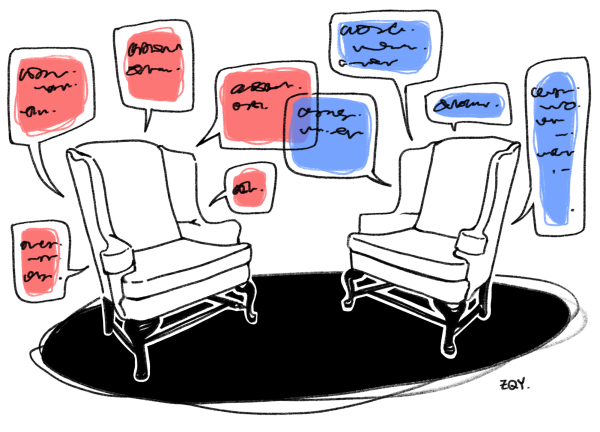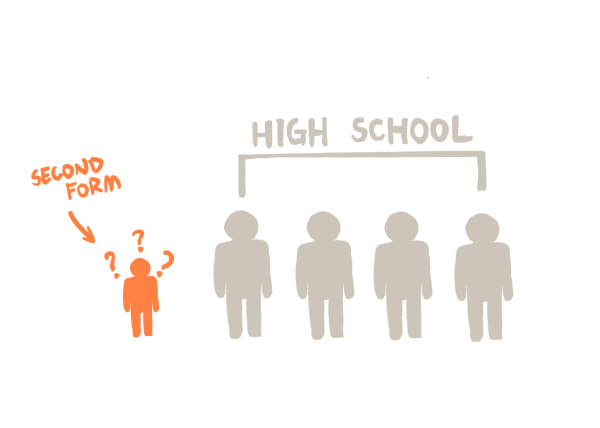In Defense of Antifa
After Charlottesville, I was greatly surprised by the reaction to Trump’s comments. Liberals widely took offense at his statement that blame for the violence belonged to “both sides.” Bill Maher, a liberal TV host and comedian who had called antifascists “babies” in April, did likewise. Mitt Romney tweeted, “No, not the same. One side is racist, bigoted, Nazi. The other opposes racism and bigotry. Morally different universes.” Such similar statements from both sides of the spectrum seemed to indicate that the Antifa movement was gaining legitimacy, and had moved away from the “alt-left” label some use to equate Nazis and their opposers.
But this seeming acknowledgement of Antifa’s validity soon ended, and articles such as “Yes, Antifa Is the Moral Equivalent of Neo-Nazis” started appearing in outlets like The Washington Post. Trevor Noah called Antifa “vegan ISIS.” In the wake of so much distortion, I felt the need to explain what Antifa actually does, as well as highlight the need for large-scale support of their movement.
Antifa – an abbreviation of anti-fascism – is a loose array of local organizations seeking to counter fascism through grassroots action rather than government policy. While violence between activists and the far right often receive the most attention, the vast majority of Antifa’s activity is spent researching and infiltrating far-right groups. Natasha Lennard, a writer and Antifa activist, says that intelligence-gathering is “most of the work…revealing who’s behind the trollish avatars online…and then also the very specific, like ‘This person is part of this group, this is their name, and this is where they work.’”
This process, called “doxxing” in Internet circles, reveals facts that are often used as leverage against members of fascist groups. Take as an example Cole White, a white supremacist who attended the Charlottesville rally. He was fired from his job after Antifa revealed his identity. While this might sound extreme, the ends justify the means – the information is used to prevent far-right racists from spreading their message and to coerce extremists into leaving bigoted groups.
Antifa is also known for its presence at protests and rallies. Here is where critics point to the more violent side of Antifa activism. I argue that Antifa’s violence is simply a willingness to risk one’s safety in countering fascism – not violence for violence’ sake, and certainly not on equal footing with alt-right violence. According to Cornel West, the Harvard professor and intellectual who protested at Charlottesville, argues that he and fellow protesters “would have been crushed like cockroaches if it were not for the anti-fascists.” Surely this is a defensible (if not laudable) use of violent force: for defense of the self and others.
The core of Antifa’s conception of violence is self-defense, and people miss that self-defense does not have to respond to an altercation – it can and should be used preemptively. According to an anonymous member of the movement in a Mic interview, “It may be that someone on the antifascist side throws the first punch, but these people are calling for war… for civil war… for a holy war… for genocide.” The goals of the far right include deporting, subjecting or even killing non-white, female, and gay people. To say that fighting fascists is immoral in light of this is absurd. Some simply say that violence is ineffective. But violent tactics deter fascists’ organizing, attending rallies or spreading propaganda.
On Meet the Press, Richard Cohen of the Southern Poverty Law Center said, “The answer to bad speech is more speech.” This is a flawed idea – to borrow language from economics, Cohen believes in a free market of ideas where the superior ones will naturally win out. A naïve view of the economy, and a naïve view of politics. Fascists were just as wrong in the 20th century as they are today. That did not prevent them from taking power then, and it will not now. We cannot regard fascism as another idea to be considered in open conversation. If open debate could defeat fascism, it would have long ago. Even Adolf Hitler acknowledged this: “Only one thing could have stopped our movement; if our adversaries had understood its principle and from the first day smashed with the utmost brutality the nucleus of our new movement.” Idealistic visions of pacifism and debate cannot provide effective resistance to fascism. Antifa does not conform to these comfortable abstracts, and instead fights fascism by any means necessary. Rather than condemning antifascists, we ought to fully support and defend their struggle.






Kenneth Sears • Aug 7, 2018 at 3:27 AM
Antifa is fascist scum. Today’s Brownshirt totalitarians. Rich, pampered, full-of-themselves, congenital malcontents and mostly rich, white civil-rights-demigod-wannabes (Look at me, I’m Gandhi!) who would cower in terror at the genuine dangers faced by historical figures like Martin Luther King. Instead, they puerilely preen themselves on rabidly harassing and assaulting a perfectly innocent couple who have no power in society beyond the power of speech—a power Antifa venomously opposes for all but themselves. They are evil. Sick and evil. They will never forgive the universe for having dared to exist without consulting them first on the blueprints. Hence their ineradicable animus to all things not created in their image.
Kenneth M Sears • Jul 16, 2018 at 9:49 AM
It’s a grievous and surprising paradox that one of the most Nazi-ish things one can do—and of late not infrequently does—is to run around screeching “Nazi!”
Historically, whether the epithet has been the N-word or “Christ-killers” or, topping today’s hit parade, “Nazis”, the aim is the same: to stigmatize, vilify and ostracize, out of a pathetic urge toward a stunted variety of self-validation.
The aim is the same and so is the spirit.
Of course, nobody but a cartoon Captain Hook gets up in the morning saying “How gloriously evil I am, arrr….” Everyone feels, determinedly, quite the paragon of virtue while denigrating, shouting down and demonizing those marked out for elimination by the princes, and princesses, of the power of the air….
Mobs have proudly screeched “Christ-killers” and the N-word assuring themselves they’re in the service of Good. Today, too, herds of fragile egos self-medicate by leaping—in a specious bravado belied by the programmatic applause—to out-audacious each other (think five-year-olds playing King of the Hill) with shrieks of “Nazi!”
And if “Nazi!” doesn’t get you sufficiently gratifying validation from the pack (who probably didn’t hear you; they’re also screaming), you can try tossing in the F-word…and maybe a sneering allusion to how “they” smell.
And if that still doesn’t reward your ego with the requisite approbation, you can always throw something through a university window. Just keep ramping it up. After all, you know the routine: it worked for you when you were two….